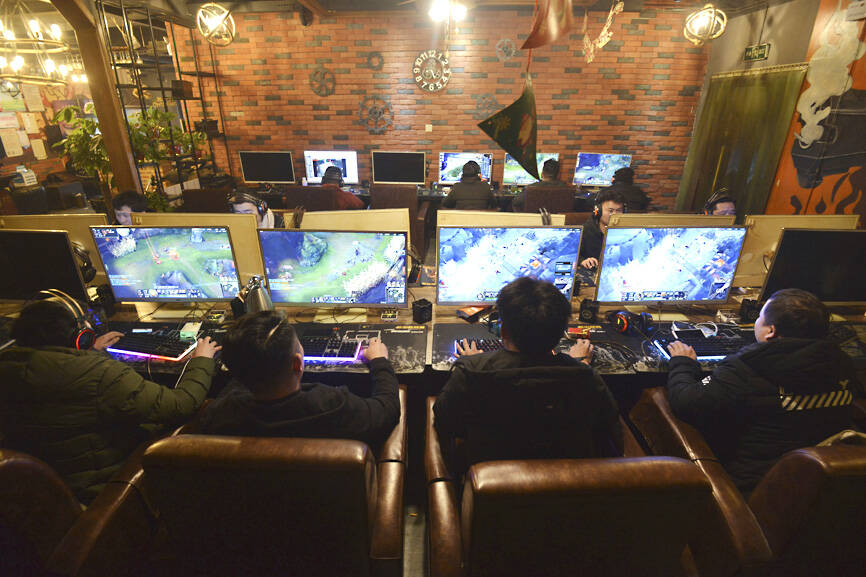China yesterday approved 105 domestic games, the latest indication that Beijing is softening its stance after its move to tighten industry restrictions led to a US$80 billion rout last week.
The titles included those operated by Tencent Holdings Ltd (騰訊) and NetEase Inc (網易), China’s two leading game publishers, which were pummeled by Beijing’s new rules.
The approvals show that Chinese authorities support the development of online gaming, an industry association wrote in a post on WeChat that was republished by the state-run Xinhua news agency.

Photo: AP
Chinese officials rekindled fear that they would start another round of tech crackdowns after China’s top gaming regulator, the National Press and Publication Administration (NPPA), announced on Friday new rules to limit the development of online games, including an unspecified cap on spending by adult players.
Additional restrictions include a ban on rewards for frequent log-ins and forced player duels, and even a prohibition on content that risks national security.
As Tencent and NetEase saw their market value plunge by tens of billions of dollars in Hong Kong on Friday, the NPPA announced during trading hours the approval of 40 imported gaming titles, including those operated by the two companies. The move did little to help restore investors’ confidence.
The administration on Saturday said that it would listen to feedback from stakeholders including companies and players to improve the rules.
The sweeping restrictions, announced before Christmas, reminded many of the brutal tech-sector crackdown of 2021. That year, Chinese agencies abruptly imposed curbs on sectors from e-commerce to entertainment, while decimating the online education industry by declaring profits illegal.
“The latest events reflect the government’s desire for a larger, more diverse gaming landscape with innovative content of a higher quality, but one without excessive monetization or pay-to-win games,” Shanghai-based games studio Paper Games (疊紙) senior vice president Yang Wenfeng (楊文峰) said. “The government prefers publishers to earn profits through fair practices and product innovation, rather than deepening monetization strategies.”

Nvidia Corp chief executive officer Jensen Huang (黃仁勳) on Monday introduced the company’s latest supercomputer platform, featuring six new chips made by Taiwan Semiconductor Manufacturing Co (TSMC, 台積電), saying that it is now “in full production.” “If Vera Rubin is going to be in time for this year, it must be in production by now, and so, today I can tell you that Vera Rubin is in full production,” Huang said during his keynote speech at CES in Las Vegas. The rollout of six concurrent chips for Vera Rubin — the company’s next-generation artificial intelligence (AI) computing platform — marks a strategic

REVENUE PERFORMANCE: Cloud and network products, and electronic components saw strong increases, while smart consumer electronics and computing products fell Hon Hai Precision Industry Co (鴻海精密) yesterday posted 26.51 percent quarterly growth in revenue for last quarter to NT$2.6 trillion (US$82.44 billion), the strongest on record for the period and above expectations, but the company forecast a slight revenue dip this quarter due to seasonal factors. On an annual basis, revenue last quarter grew 22.07 percent, the company said. Analysts on average estimated about NT$2.4 trillion increase. Hon Hai, which assembles servers for Nvidia Corp and iPhones for Apple Inc, is expanding its capacity in the US, adding artificial intelligence (AI) server production in Wisconsin and Texas, where it operates established campuses. This

Garment maker Makalot Industrial Co (聚陽) yesterday reported lower-than-expected fourth-quarter revenue of NT$7.93 billion (US$251.44 million), down 9.48 percent from NT$8.76 billion a year earlier. On a quarterly basis, revenue fell 10.83 percent from NT$8.89 billion, company data showed. The figure was also lower than market expectations of NT$8.05 billion, according to data compiled by Yuanta Securities Investment and Consulting Co (元大投顧), which had projected NT$8.22 billion. Makalot’s revenue this quarter would likely increase by a mid-teens percentage as the industry is entering its high season, Yuanta said. Overall, Makalot’s revenue last year totaled NT$34.43 billion, down 3.08 percent from its record NT$35.52

OPPORTUNITY: Supply of conventional DRAM chips tightened after the world’s major memory makers focused on manufacturing chips utilized in AI servers DRAM chipmaker Nanya Technology Corp (南亞科技) yesterday reported a spike in revenue for last month, as severe supply constraints prompted chip price hikes, almost doubling the company’s annual revenue last year from the previous year. Revenue soared 444.87 percent last month to NT$12.02 billion (US$381.4 million), from NT$2.21 billion a year earlier. That brought fourth-quarter revenue to NT$30.17 billion, from NT$6.58 billion for the same period in 2024. On a quarterly basis, revenue jumped 60.65 percent from NT$18.78 billion. Last year, revenue soared 95.09 percent to NT$66.59 billion from NT$32.13 billion in 2024, the company said. Supply of conventional DRAM